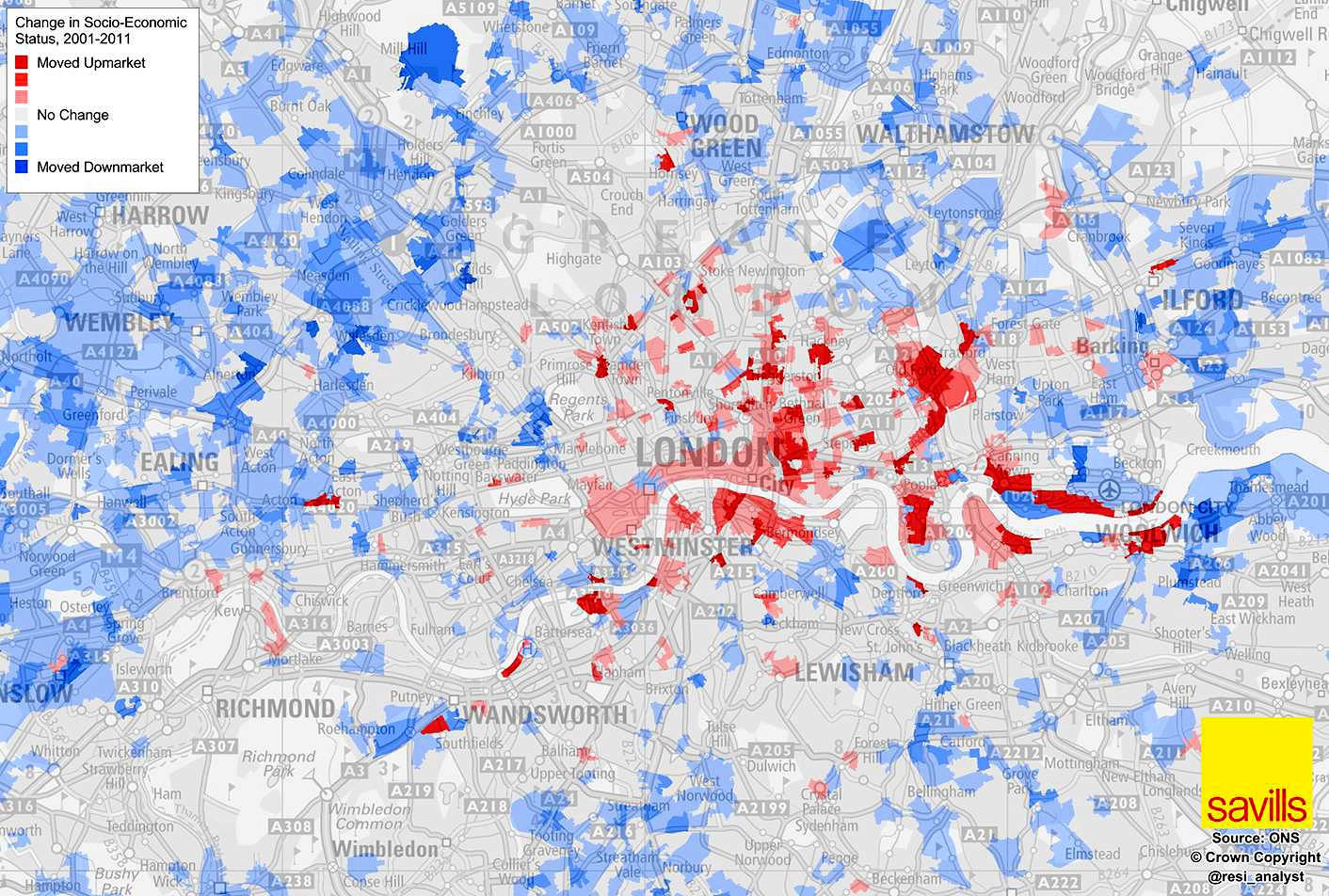I now wish to look at the battlegrounds by area, to see what regional variations we might expect. Confirming all perceptions of Londoncentricity, I'm going to start with the capital.
What is different about London? Everything. It's far richer than the rest of the country. Inner London is by some way the highest earning region in the EU:
Its property market is famously expensive, both to buy and to rent. Its economy is growing far faster than the rest of the country:
But the top nine boroughs with the worst risk in 2012 of long term unemployment and the top 11 boroughs with the worst child poverty are all in London:
It is a city of extremes.
Its electorate looks different from the rest of the country. It's much younger:
And it changes very rapidly. In 2012, 360,000 people moved out of London and 370,000 people moved in:
So over the course of a five year Parliament, one eighth of the population of London will have been replaced. And that doesn't count those who move within London. Demographic change is very rapid.
This means that it is very dangerous to assume that London's constituencies will change in line with national trends or even that they will swing evenly within London. London's priorities are not the priorities of the rest of the country and the map is fast-changing.
There has been a recent Survation London-specific opinion poll with a Westminster voting intention:
The Westminster voting intention question seems to have been asked late, so I'm not sure how reliable the headline results are (Lab 42, Con 26, UKIP 14, Lib Dems 11). If sub-samples are to be believed, UKIP are much stronger in east London than elsewhere. That fits with anecdote, though sub-samples are fools' gold.
There's an older poll from YouGov from last October also:
This had the result Lab 45, Con 32, Lib Dems 10. The swing in that poll was similar to the swing in national YouGov polls at the time.
With that long preamble, let's have a look at the constituencies that are potentially in play:
To explain the table, the third column reflects the effect on the majority in Labour/Conservative marginals that would be had by allocating a quarter of the Lib Dem vote to Labour (the figure is derived by assuming that half will desert the Lib Dems and that these will break for Labour rather than the Conservatives in a 3:1 proportion).
The first thing to note is how few marginals London has. There are 73 constituencies in London:
The bookies expect only five to change hands, with a sixth being a toss-up. If the bookies are right, London is going to be of marginal significance for the next election.
Are the bookies right? Let's have a look at some of the demographic change. The city is slowly inverting, with inner London rising socio-economically and the suburbs going into relative decline:
Note how rapidly inner east London has been rising.
London is getting less white and less British in general, but it's a complex pattern.
This is electorally significant because ethnic minority voters break much more strongly for Labour than one would expect from all other indicators. So London should be becoming a more Labour city, particularly in the outer northwestern and northeastern suburbs.
Taking all these things together, two bets stand out. The 8/15 in Battersea on the Conservatives with Stan James is far longer than elsewhere and ignores both the solidity of the majority and the continuing gentrification of the area. It was 8/13 when I took it and I still like this price at 8/15. If you don't agree with me, back Labour with Ladbrokes at 5/2 because there's an underround on this market. Or back both, if you want a safe return (subject to the continuing viability of both of those bookies).
Secondly, given the demographic change and the number of squeezable Lib Dems, the Conservatives in Finchley & Golders Green are way too short at 1/6. The 7/2 on Labour looks like a rare example of value Labour constituency bet.
The 11/2 in Westminster North is worth considering. The benefits cap has resulted in some poorer residents leaving the inner London boroughs. Dame Shirley Porter may smile wryly at seeing homes for votes work in reverse.
If you forced me to bet on another longshot Conservative win, I suppose I'd choose the 12/1 in Dagenham & Rainham. Fortunately, you can't, so I won't.



No comments:
Post a Comment